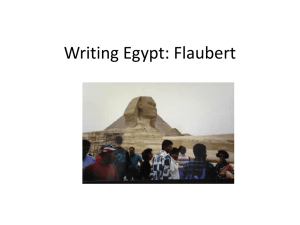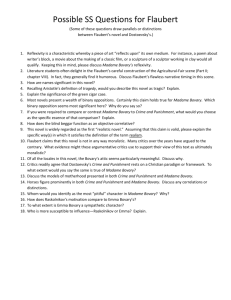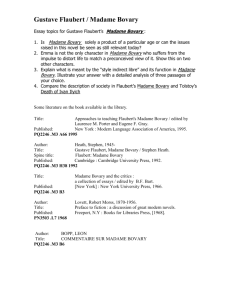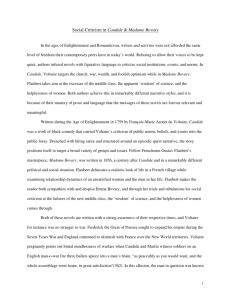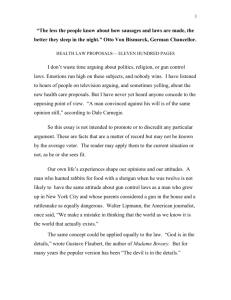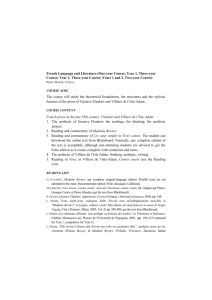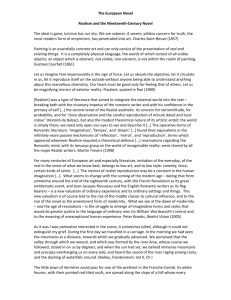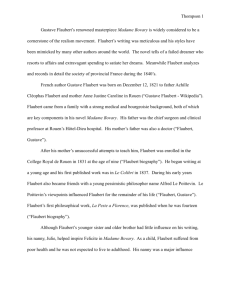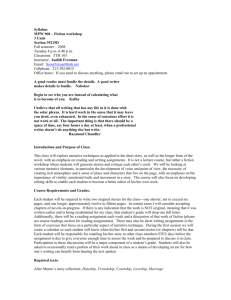insightLMU ReseaRch
advertisement
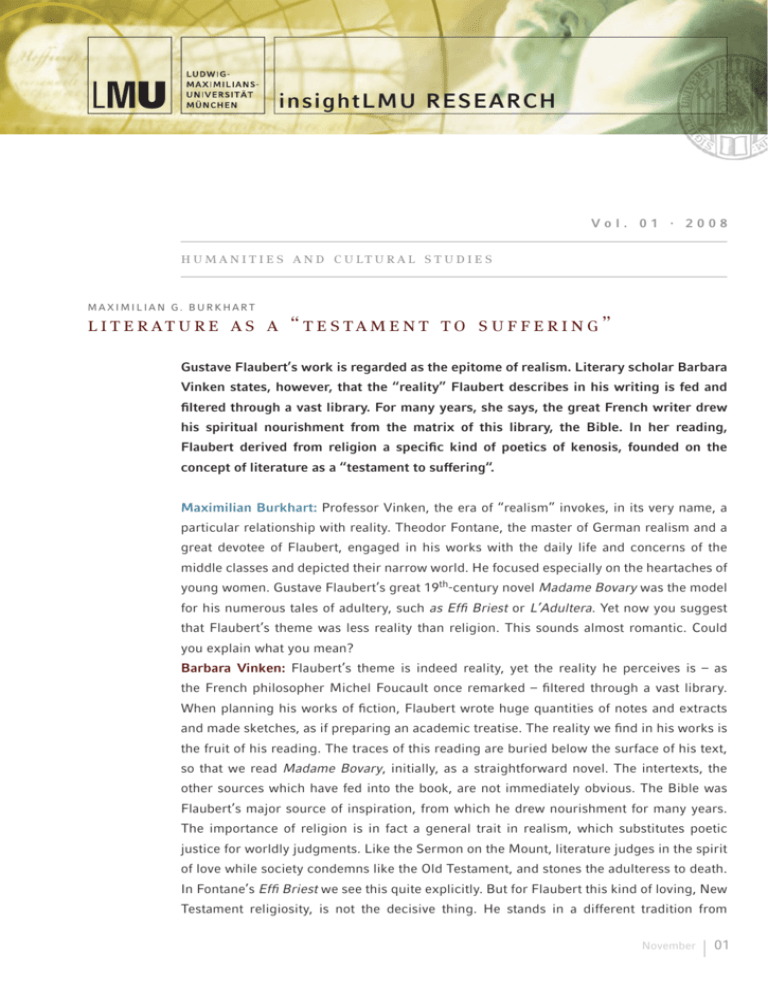
insightLMU Research Vol. 01 · 2008 h u m a n i t i e s a n d c u lt u r a l s t u d i e s M a x imili a n G . B u r k h a r t l i t e r at u re as a “ t e sta m e n t to s u f f e r i n g ” Gustave Flaubert’s work is regarded as the epitome of realism. Literary scholar Barbara Vinken states, however, that the “reality” Flaubert describes in his writing is fed and filtered through a vast library. For many years, she says, the great French writer drew his spiritual nourishment from the matrix of this library, the Bible. In her reading,­ Flaubert derived from religion a specific kind of poetics of kenosis, founded on the ­concept of literature as a “testament to suffering“. Maximilian Burkhart: Professor Vinken, the era of “realism” invokes, in its very name, a particular relationship with reality. Theodor Fontane, the master of German realism and a great devotee of Flaubert, engaged in his works with the daily life and concerns of the middle classes and depicted their narrow world. He focused especially on the heartaches of young women. Gustave Flaubert’s great 19th-century novel Madame Bovary was the model for his numerous tales of adultery, such as Effi Briest or L’Adultera. Yet now you suggest that Flaubert’s theme was less reality than religion. This sounds almost romantic. Could you explain what you mean? Barbara Vinken: Flaubert’s theme is indeed reality, yet the reality he perceives is – as the French philosopher Michel Foucault once remarked – filtered through a vast library. When planning his works of fiction, Flaubert wrote huge quantities of notes and extracts and made sketches, as if preparing an academic treatise. The reality we find in his works is the fruit of his reading. The traces of this reading are buried below the surface of his text, so that we read Madame Bovary, initially, as a straightforward novel. The intertexts, the other sources which have fed into the book, are not immediately obvious. The Bible was Flaubert’s major source of inspiration, from which he drew nourishment for many years. The importance of religion is in fact a general trait in realism, which substitutes poetic ­justice for worldly judgments. Like the Sermon on the Mount, literature judges in the ­spirit of love while society condemns like the Old Testament, and stones the adulteress to death. In Fontane’s Effi Briest we see this quite explicitly. But for Flaubert this kind of loving, New Testament religiosity, is not the decisive thing. He stands in a different tradition from November 01 ­Fontane, and for him literature is a monument to suffering. It promises neither justice nor redemption, but instead bears witness to a suffering modelled wholly on the Passion of Christ. Flaubert’s literature is a monument to the Cross, a testament to suffering. Unlike Christ, and also in a different way from Effi Briest, Emma Bovary is completely entangled in guilt. The consequences of her adultery are devastating: she ruins her husband and her only child is forced to become a cotton spinstress – a profession which in those days ­commonly led to an early death. And yet despite this she has real – if perverse – human feelings, whereas her contemporaries have hearts of stone. So what does religion mean in the work of Flaubert? It means that biblical exegesis is central to Madame Bovary, deter­ mining the novel and the view of reality it depicts. In Flaubert’s novels, narrative places itself beyond all secular reality as the unfolding of Christ’s suffering. However, as in Emma’s death agony for instance, the promise of redemption linked with this is called into ­question. Burkhart: In the 19th century, religion is ousted by science. We can see this embodied in Madame Bovary herself: Abbé Bournisien, the priest to whom Emma Bovary turns for help, sends her back to her husband Charles, a doctor. The trajectory leads from the Church to the pharmacy. In the 19th century, the ideal of Mary the mother of God turns into the ­ideology of the middle-class housewife. But in Flaubert these concepts collapse. Why? Vinken: One of Flaubert’s central themes is the competitiveness between different institutions that promise salvation. You have the Church on the one hand, with Christ the healer presented as physician. Then on the other you have medicine, which seeks to replace this function of the Church. Flaubert was the son of Rouen’s most famous doctor. There is surely an Oedipal aspect in Flaubert condemning medicine to impotence in Madame Bovary. This may also express a revolt against his own inability to follow in his father’s footsteps. Instead of doing so, he retires on a small pension to the family house in the provinces, where he lives with his mother. But this is just one aspect. The other is again connected with the theme of suffering. Flaubert made a precise study of the medical research of his time and incorporated it into his work. In Madame Bovary, by precisely detailing various theories and interpretations of medicine, he shows us that this promise of healing is still more disastrous than that of religion, and that in fact these two purportedly healing institutions are united in calamitous collaboration. This is a very pessimistic worldview. The prom­ ises of salvation become a curse for those who believe in them. Literature is the place where the deception practised by these promises of redemption is revealed. Burkhart: Flaubert himself described L’Éducation Sentimentale as his masterwork. This tragic story of love and friendship takes place amidst the upheavals of the 1848 revolution, and its theme is that of disillusion with the great contemporary ideas of social revolution. Flaubert was often labelled a reactionary in consequence. You, on the other hand, assert that Flaubert was still more radical than Karl Marx in his criticism of the prevailing conditions. How do you mean this? Vinken: Yes, he is tougher in his critique than Marx. Flaubert was always accused of failing to support the workers’ uprising against the bourgeois classes in the June revolution of November 02 1848, which was bloodily suppressed by General Cavaignac. But what are the facts? For the first phase of the revolution, the February revolution, in which the middle classes and the proletariat fought side by side against the monarchy, Flaubert draws on sources in the “right-wing” press. For the second phase, in contrast, he draws only on “left-wing” sources – those, therefore, which succumb. Unlike Marx, Flaubert does not believe that the revolution can bring salvation. Flaubert models the revolution of 1848 on the Roman civil war. The Roman poet Lucan begins his great epic Pharsalia with the words: “My song is internecine strife”. In his Éducation, Flaubert shows how the brothers-in-arms of yesterday become today’s fratricides. But above all he shows how the putsch by Napoleon III, which seals the end of the Republic, sanctions this fratricide. Flaubert transposes Lucan’s condemnation of the Roman civil war to revolution and coup d’état. This is a very harsh ­judgment, which Flaubert makes here by the same means as in Madame Bovary. The ­republican revolutionaries slaughtered by their brothers-in-arms of yesterday are metaphors of Christ’s suffering. Burkhart: The late collection of short stories Trois Contes is likewise one of Flaubert’s ­masterpieces. These are somewhat strange stories, which read like legends of the saints. In the last story, ‘Un Coeur Simple,’ Flaubert describes the life of a simple, good-hearted lady’s maid named Félicité, a namesake of the maid in Madame Bovary. Could it be that in his old age, like many artists, Flaubert became more reconciled with religion? 5 A page out of the original manuscript of Madame Bovary with corrections. In 1856, the novel was prepublished in La Revue de Paris, before being published as a book in 1856. November 03 Vinken: No, on the contrary. The Trois Contes represent, rather, the fiercest possible ­repudiation of the spirit of Christianity. The New Testament‘s promise of salvation and resurrection here assume the form of a phallic old wives’ tale. The ascension of St. Julian in the arms of the Redeemer, the ecstatic love-death of simple-hearted Félicité, express the ­wholesale collapse of the Christian promise. Flaubert reads the Christian promise of transfiguration as a throw-back to heathen idolatry. He cancels Christianity’s promise of salva­ tion to promote, instead, Christ’s loss and relinquishment of divine status, in the sense of the phrase: “He assumed the form of a slave and died the death of a slave.” Burkhart: This seems reminiscent of Friedrich Nietzsche. La Légende de Saint Julien L’Hospitalier is the medieval legend of a knight who inadvertently kills his parents in a rage of jealousy. He voluntarily goes into exile to do penance, and ultimately proves his generos­ ity by sharing his bed with a leper – who is, however, none other than Christ himself, who leads Julien back to paradise. In Flaubert’s version, the second story in Trois Contes, the legend is a very unsettling text. In a moment of magical transformation, a monster is ­vouch­safed divine grace. You say this ironises the promise of salvation. Can one therefore regard Flaubert as closely akin to Nietzsche? Vinken: Critical theory has often done so – wrongly in my opinion. Nietzsche thought ­Flaubert somewhat feeble. Flaubert does not share Nietzsche’s revolt against Christianity as a castrating religion which one must oppose with the new paradigm of the overman, the really male man. He would have hated all this ‘superman’ talk, and would probably also have found it somewhat ridiculous. Nietzsche’s antisemitism was wholly alien to him too. Only in the late text The Antichrist can one find in Nietzsche a trace of Flaubert’s kenosis stance – that is, his idea of the relinquishment of Christ’s divinity. But Nietzsche immedi­ ately finds this alarming. Yet before this turning-point in his text, an interesting moment arises: “In Christ“, he says, “it was merely Christ who died.” Later this was fundamentally misunder­ stood as “God is dead”. So Nietzsche and Flaubert share this negative moment, this interpretation of relinquishment. Burkhart: This leads us back again to Madame Bovary. The novel is shot through with telling names. The word ‘bovine’, indicating the flesh, is hidden in the name of Emma’s husband Charles Bovary. Her lover, on the other hand, is called ­Rodolphe Boulanger de La Huchette. He thus ­represents the baker, corn, in other words agri­ culture. These names evoke the Biblical story of the hunter and meat-eater on the one hand, and of the farmer and vegetarian on the other. In the very 1 Gustave Flaubert (1821-1880) in an undated photographic ­portrait. names of the male characters in Bovary is reflected a story about violence and love, the story November 04 of Cain and Abel. Does Abel’s idea of love without violence conceal, for Flaubert, a hidden plan for salvation? Is Flaubert actually a forerunner of the hippies? Vinken: There’s just one problem with this interesting observation: Bovary’s love for ­Boulanger leads to catastrophe. In the scene where Rodolphe betrays his love, Flaubert compares his heart with a school-yard trampled flat by children. Flaubert does not believe in happy erotic love, and he himself never experienced this. In human erotic love, which he described most vividly in Madame Bovary, with her endless, unquenchable longing, he sees a perversion of divine love. Walter Benjamin makes a very beautiful comment on Proust which also applies to Flaubert: “He affirms life even in its most bestial and degenerate form.” In his own work, Flaubert erects a monument to the most bestial and degenerate figures. Burkhart: You are planning to set up a Flaubert center in Munich, as a joint German-French venture. Why Munich? Flaubert was a French writer after all. Wouldn’t Paris, or Flaubert’s birthplace of Rouen in Normandy be more suitable locations for this project? Vinken: The spiritus loci is of little help here. In collaboration with Paris, the aim of the Flaubert center is to de-nationalize Flaubert, on the model of ancient authors. I have the idea of establishing a few European authors in a way that gives them international scope, like Ovid or Horace. My aim is to strengthen the canon and thus help override modern literature’s national ties. Through French-German collaboration, the Flaubert center will cultivate Europe-wide Romance studies, giving rise to a European research network beyond bi-national and hierarchical relationships. This must also, in a further step, include the United States as well. Burkhart: The Flaubert center was born from the idea of classical authors. The great­ scholar of Romance literature Hugo Friedrich once said that the history of literature could invariably be subdivided into two opposite movements: a tendency towards the classical and a tendency towards the decadent. In your interpretations of Flaubert’s texts you always emphasize his closeness to Ovid and Lucan – two authors from the so-called silver age of Latin literature, which Friedrich clearly assigns to the decadent tendency. Are you sub­ verting the classical period by stressing the momentum towards decline? Is your project actually trying to establish an anti-classical movement in the guise of classicism? Vinken: I am no fan of the ancient classics – I prefer Lucan to Vergil. But I am concerned with Flaubert’s place in the canon rather than with him as classicist. Flaubert created a form of prose which is incredibly dense and expressive. We are really only just beginning to proper­ly analyze this refinement. Such compact and wrought prose is really otherwise only possible in poetry, and herein lies Flaubert’s great service to the French language. Above all he achieves this through rich intertextuality. Superficially, Flaubert’s style gives a somewhat classical, smooth impression. But I find it more helpful to analyze his position within an anti-Christian spectrum, to see him within a tradition of amour pur, of pure love, than to assign him to the endless rise and fall of ‘classical’ and ‘decadent’. This helps stimulate an urgently needed rethinking of modern literature, revealing a real alternative to schools of criticism and irony supposedly still indebted to the Enlightenment. Above all, though, this November 05 can give rise to a new conception of modern subjectivity. The tradition of amour pur can be traced back to its archetype in Christ’s relinquishment of divine status. This idea has been banished from theology and philosophy, but can now take its genuinely modern place ­instead in literature and psychoanalysis. Burkhart: Flaubert’s texts always seem to contain a form of Platonism, as embodied in the Pauline utterances of the New Testament. In Madame Bovary, Flaubert develops a concept of eros, an idea of love, which is antagonistic to the body. And like Plato in Phaidros, he also criticizes written language as negative. In the New Testament‘s Letter to the Corinthians, it says: “For the letter killeth, but the spirit giveth life.” Yet Flaubert is at the same time a writer, and uses writing itself as the medium to criticize the written word. In other words, he attacks it and affirms it simultaneously. Is Flaubert pursuing a kind of theo-poetics? Vinken: As far as Flaubert’s Platonism is concerned, Jacques Derrida was of a different opinion. And I am too. But as to the underlying dynamic which you have analyzed: yes, this is the form of the cancelled affirmation. And in this paradoxical sense, if you like, it has a theo-poetic character. Professor Barbara Vinken has held the chair of French literature and general and comparative literary theory at the Institute for Romance Philology since 2004. With the support of the German Research Foundation and its French counterpart, the ANR, she is currently establishing an international Flaubert center in Munich. http://www.barbaravinken.de/News barbara.vinken@romanistik.uni-muenchen.de November 06
